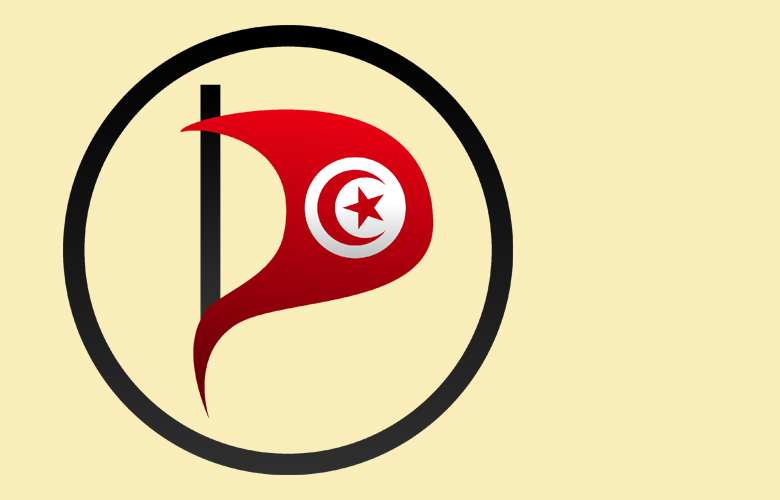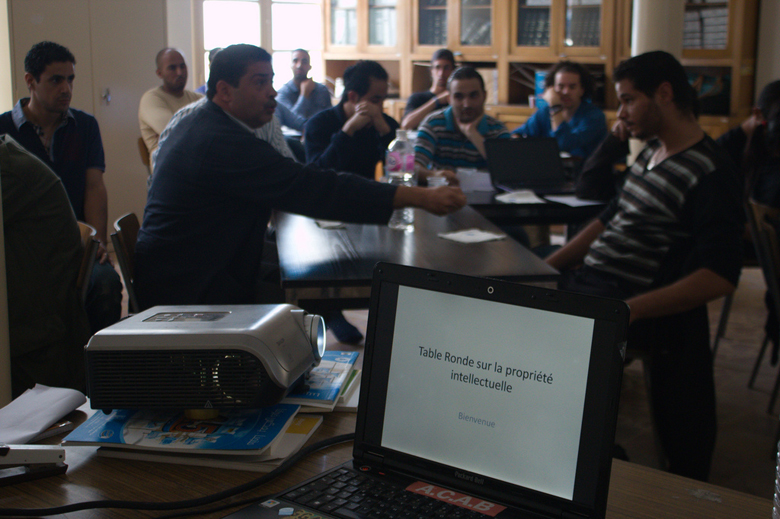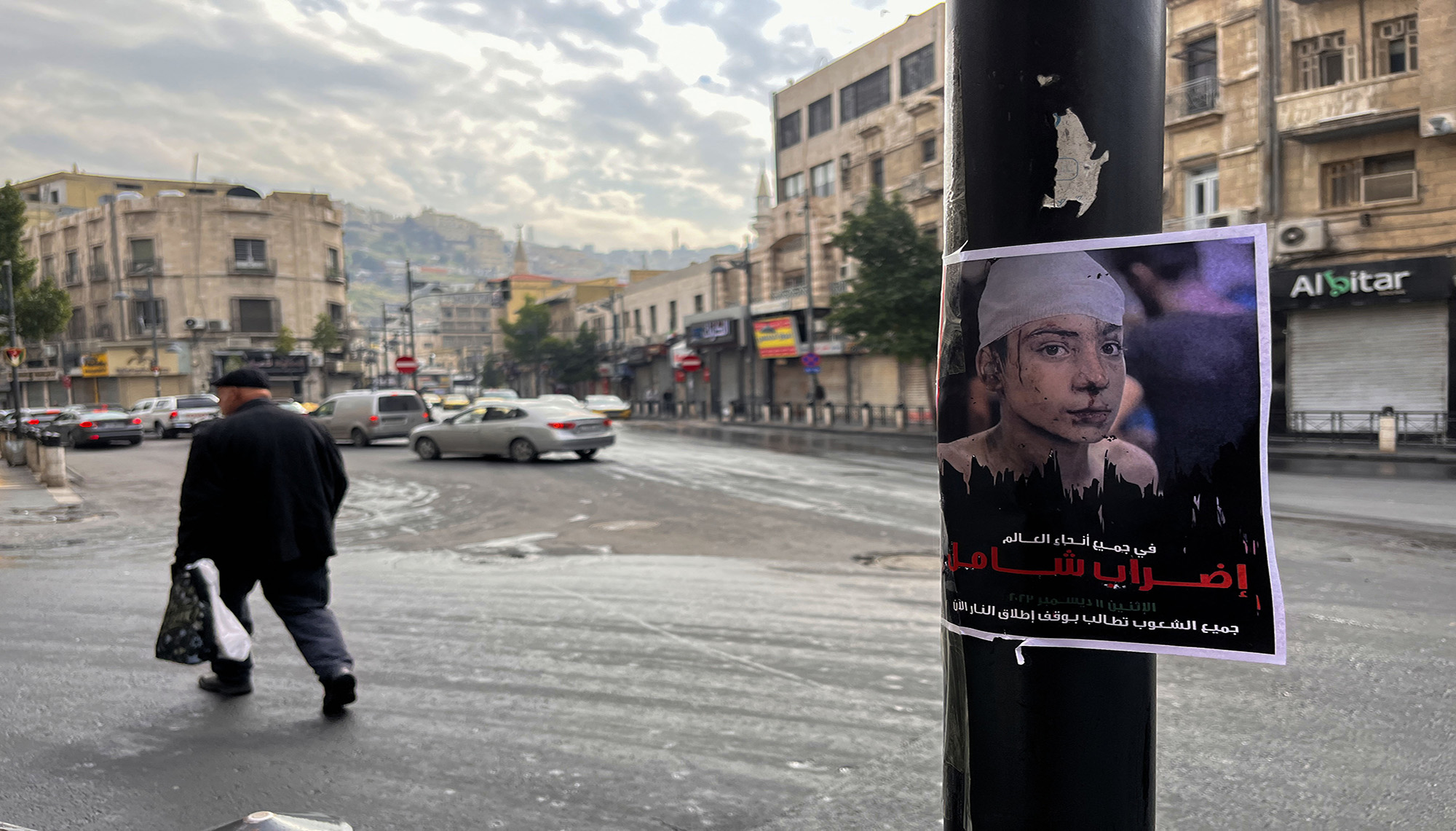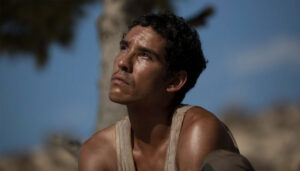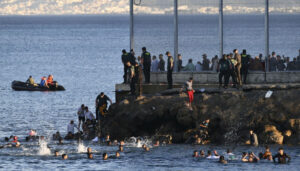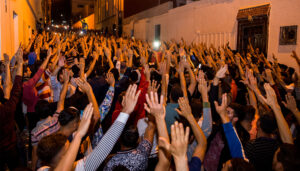By Mohammad Tarakiyee
(لقراءة هذا المقال بالعربية، اضغط/ي هنا)
On May 23rd, inside the Tunisian lower court, a couple of judges deliberate the fate of Azyz Amami, a Tunisian blogger and Human Rights activist, regarded by many as one of the faces of the Tunisian revolution. Outside the court, I join his colleagues, friends, and family who have been waiting for the court decision since the morning. Every once and a while, they would sing songs and chant words of support, many of which were coined by Azyz, himself not a stranger to standing on the other side of the court’s steel fence.
On the day prior to his arrest, Azyz had come out on national TV claiming he had eyewitness reports that saw police officers involved in burning their own police station during the revolution. It was officers from that particular station that later arrested him and roughed him up, on allegations of drug possession. He had been extremely vocal about the trials against more than 50 people accused of burning police stations. The sit-in repeats the chants: “Even I have burned the Police Station,” “Revolution is not a crime,” “Let go the youth of the revolution,” “Let go the son of our nation.”
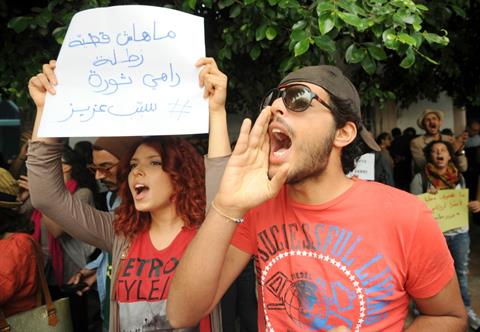 While the campaign protests police brutality and systematic targeting of youth, and demands amnesty for what they see as revolutionary acts, the campaign has received public backlash and was perceived as a call for violence. The Azyz trial has become a litmus test for both sides, one seeing it as a proof the state was attempting to silence dissent, and the other saying that if the charge were true, no one should be above the law.
While the campaign protests police brutality and systematic targeting of youth, and demands amnesty for what they see as revolutionary acts, the campaign has received public backlash and was perceived as a call for violence. The Azyz trial has become a litmus test for both sides, one seeing it as a proof the state was attempting to silence dissent, and the other saying that if the charge were true, no one should be above the law.
In the three years since the Tunisian revolution broke out, the number of cases against Tunisian youth has been steadily rising. The small kiosk in front of the court decides it’s time to close and turns off its neon light, throwing the sit-in in complete darkness. Wassim turns to me and says, “it’s a common tactic, they try and wait till the last minute to tell us the decision.”
The problem, after the revolution, is how the government is trying to indirectly control speech. They maliciously prosecute individual activists, such as Azyz, with trumped up charges.Or they use articles such as the blasphemy law to control speech.
Wassim Ben Ayed is a founding member of the Pirate Party* in Tunisia, officially established shortly after the Tunisian revolution in April 2011. It came about in a series of informal discussions between Tunisian online activists and bloggers, inspired by the global Pirate movement. In 2010, two unsuccessful attempts were made during the Ben Ali dictatorship to form an official party.
The group of pirates was particularly instrumental in breaking the media blackout during the early days of social unrest. They helped document and relay human rights abuses during the riots in the cities of Sidi Bouzid, Siliana, and Thala, as well as disseminate censorship circumvention software. Three members of the group at that time and two other online activists were arrested, and Azyz was one of them. After their release, a fellow pirate, Slim Amamou, went on to become a minister in the interim government. He later resigned after a military tribunal ordered the censorship of a number of websites and Facebook profiles.
“We do have freedom of speech,” insists Wissam, “all Tunisians are aware of the value of it, and I dare say they do not want to lose it, because they are now better off for it. They’re expressing their concerns and their thoughts with more freedom. The problem, after the revolution, is how the government is trying to indirectly control speech. They maliciously prosecute individual activists, such as Azyz, with trumped up charges.Or they use articles such as the blasphemy law to control speech.”
“The reason we established a party, and not an organization or an association, is because we want to change laws. We want to reflect our ideas on the current laws and improve on them, and we want to raise awareness about the importance of what we struggle for. We are, as a part of the global Pirate Party movement, tired of trying to convince politicians that electronic surveillance and censorship harms the rights of citizens. We established a party because we don’t want politicians to speak in our name, we want to raise our voice within the political process.”
With 300 enlisted members and 30 working members, they are one of Tunisia’s smaller parties. But that does not keep them from challenging the authorities. They currently have two court cases to fight mass surveillance, against the prime ministry and the newly established surveillance authority, the ATT. “The ATT is a new, old system, the people who work in it had no legal cover after the revolution, so they came up with a new name for it. It previously fell under Ammar 404, which was the Tunisian censorship and surveillance system. We are against having a surveillance agency that monitors all Tunisians at all times.If it absolutely has to exist, we suggest that it only surveils individuals based on a court order, because they are under suspicion of a dangerous crime such as terrorism.This is already possible under current laws.”
According to Wissam, the laws were not the only thing to change after the revolution. “It changed the way we think. We realised how easy it is to relapse into a dictatorship. It’s true that the regime has changed and became more democratic, but we are working hard to prevent a dictatorship from happening again. Even as we formed the party, we tried to make it impossible to have a dictatorship inside of it, before outside of it.”
A continuous democracy: not a democracy of the ballot boxes, where you go and vote every five years, and then you go home. A democracy that depends on continuity and constant reflection on all societal issues, unlike representational democracies.
The pirate model for democracy goes beyond preventing dictatorships, as Wissam explains. They want to usher in alternative modes of democracy, one where all members of society participate in the decision process. “A continuous democracy,” he elaborates, “not a democracy of the ballot boxes, where you go and vote every five years, and then you go home. A democracy that depends on continuity and constant reflection on all societal issues, unlike representational democracies.”
It goes beyond wishful thinking, they have concrete plans for a better democracy. The Internet plays an important role for them to reach out to Tunisian citizens. They hope to have an online voting system as well as representatives in the parliament by 2019. What makes them different, is the fact that the online voting system will be continuously used, and will decide how their representatives vote.
The Pirates believe that their governance model is the future,“We are still growing, and our goals are for the far future. Those who have attended our meetings say that the pirates are working on the deep issues that other Tunisian parties don’t care about. For example, in terms of intellectual property, we tried to contact parliamentarians to change the related article in the constitution. We have also done a workshop that brought together filmmakers and pirated CD sellers, in order to find an understanding that benefits both.”
“In our campaign ‘Ideas are not Property’, we work against the notion that ideas are a product that can be bought and sold. Ideas can be transferred, improved, shared and contributed. If I have a product, and you have a product, and we swap them, we’ll both have one product. If I have an idea, and you have an idea, and we share, we’ll both end up with two ideas.”
They insist that the campaign does not target content creators. “We are with creator rights, and we respect an author’s right in their work. The way intellectual property works now puts a heavy burden on people, drains our economy, and erect barriers to the access of information. Companies prevent many from their right to access art, culture, and information.
In the past, you would put a book in a library, and thousands would enjoy reading it. Now, if you put a book on the Internet, and thousands download it and read it, these companies would claim that this is stealing. We’re against using the concept of stealing in this context. We’re against intellectual property because it’s a form of cultural colonization, and it deprives many from the right to enjoy humanity’s collective output of culture, art, and science.”
The Tunisian Pirate Party aspires to become a voice of a generation. They describe themselves as the only Tunisian party established in the 21st century, by the ideas of people who belong to the 21st century.
Back at the Tunis Palace of Justice, the sit-in undergoes a revival. A couple of activists start giving speeches, and even the police, which has so far remained within the justice compound, come closer to listen. The activists’ demands focus on an independent judiciary and a reform of the police, in particular the infamous La Goulette police station, the same one that had arrested Azyz.
There is a tense silence as the sentence is read, and then a roar of jubilation. The case was dismissed, Azyz was set to be released that night. Part of the crowd resumes their chanting, while the other half update their social media profiles and call their friends. It doesn’t take long for the celebrations to become more cautious, as the somber reminder of all the youth still in jail sinks in.
*The moniker “Pirate” in the sense of free culture advocate was first used by the Swedish organisation Piratbyrån (“The Pirate Bureau”), established to support the free sharing of information, culture, and intellectual property. The name was chosen to counter Swedish IP lobby groups such as the Anti-Piracy Bureau. The movement later inspired other entities to use the same name, such as The Pirate Bay, and the Pirate Party.
